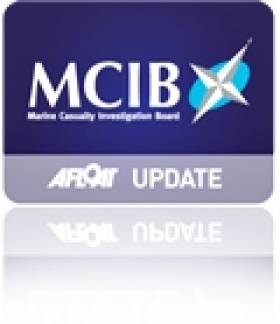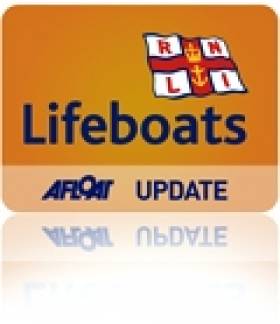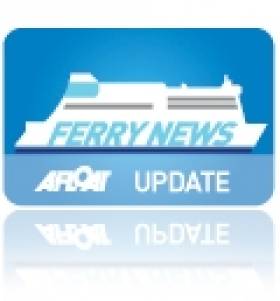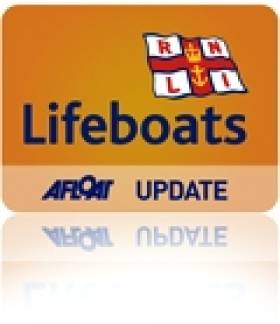Displaying items by tag: capsize
Castleconnell Boat Club Reacts to Shannon Incident
Castleconnell Boat Club has released a statement regarding the capsize on the Shannon:
Early this morning (Thursday 4th February) Castleconnell Boat Club was informed that a number of individuals had entered the club grounds at World’s End at approximately 4am. The club was only recently accessible after weeks of total flooding, and much of the surrounding area had been under water, or damaged. Four men removed one of the club safety launches, which was without an engine, and put it on the water.
With flooding still an issue the water was very high, and the water extremely fast. We have been told that the men got into difficulty very quickly, and we believe they capsized nearby. Early news reports say that that emergency services spent several hours rescuing them and that they are being treated in Limerick Hospital.
Safety is always the top of CCBC agenda and the thoughts of anyone on such dangerous water especially at that time of night, and without means to propel the boat is frightening in the extreme. No members have been permitted on the water for over two months, due to safety concerns.
The dangers of water cannot be over emphasised and we commend the bravery and the professionalism of the Coast Guard, and the Emergency Services.
Our thoughts and best wishes are with the individuals and their families at this terrible time.
Yours in rowing,
Francis Moloney
Club President CCBC
Boater Critical After Rescue From Shannon Boat Capsize
#Shannon - A local man is in critical condition after the boat he was in capsized on the River Shannon in Castleconnell outside Limerick city early this morning (Thursday 4 February), as RTÉ News reports.
The man was one of four who were in the water for more than two hours clinging to their upturned vessel as rescuers struggled to reach them due to a fallen tree in the river.
RTÉ News has more on the story HERE.
Irish Woman Dies in Yacht Capsize
An Irishwoman has died after a yacht capsized and broke into pieces in South Africa. The 49-year-old woman was on-board the boat Tara in the early hours of yesterday morning with two other crew members when the incident occurred according to the Irish Sun.
The boat turned over between Melkbosstrand and Yzerfontein on the West Coast in Western Cape.
A 66-year-old Irishman, who is a resident in the area, managed to swim to the shore and raise the alarm.
However the Irish woman and a Scottish male were killed in the incident.
The Irish Sun has more on the story here
Lack Of Experience, Absence Of Radio & Stability Issues Compounded 'Zillah' Dinghy Tragedy - MCIB Report
#Zillah - Lack of seafaring experience and the absence of a VHF radio or other means of contact compounded a tragic situation that led to the death of a retired teacher after the capsize of his dinghy off West Cork last summer, according to the official investigation into the incident.
As previously reported on Afloat.ie, an inquest into the capsize of the Drascombe Lugger Zillah returned a verdict of accidental death in the case of 66-year-old Douglas Perrin, who drowned after his vessel overturned and sent him and two companions into the water off Castle Island near Schull on the evening of 13 August last.
The court heard that guests Marian Brown and Patrick Anwyl, neither experienced sailors, were taking turns at the helm under the supervision of Perrin, a sailing instructor for more some 30 years, when the boat overturned in gusty weather.
As the report by the Marine Casualty Investigation Board (MCIB) outlines, it was found that the boat - built before the Recreational Craft Directive requirement and of a type known to have stability issues in certain conditions – gybed suddenly on the approach to the Amelia Buoy at the Schull Harbour entrance, taking all three by surprise.
The vessel quickly turned turtle, with its centreplate retracting into the stowed position, and the guests managed to clamber onto the upturned hull with Perrin in the water beside them.
However, they did not have a VHF radio or EPIRB-type beacon on the vessel, and there were no other boats in the vicinity to witness the incident not spot the casualties and attempt rescue.
Despite the mild water temperature, none of the three were wearing more than light summer clothes with their PFDs, and Perrin spoke of feeling cold within 30 minutes.
After the three attempted to swim some 50 metres to nearby rocks on Castle Island, Perrin was separated from his guests, who later saw him drifting past the island making no effort to swim but with his head above the waves.
It was many hours later into the following day, after an alert by Perrin's wife who had been expecting the group's return, that Brown and Anwyl were located and rescued by emergency responders. The body of Perrin was found a short time later off Sherkin Island.
The MCIB found that the guests' lack of sailing experience "meant that they did not react correctly to the developing situation" when the boat suddenly gybed.
Moreover, the lack of a radio, which would have immediately alerted any number of vessels in the nearby Schull area as well as emergency teams, would have likely seen all three rescued in a matter of minutes.
It's also possible that had their PFDs been fitted with lights and whistles, the guests may have been spotted sooner by search and rescue crews.
The full report into the Zillah incident by the MCIB, including its safety recommendations, is available to download HERE.
#dinghycapsize – Volunteer lifeboat crew with Kilkeel RNLI launched yesterday evening at 6.30pm following reports of two people in the water off Killowen Point on Carlingford Lough. It is understood a member of the public raised the alarm on seeing two people in the water after their dinghies capsized.
Conditions at the time were choppy with a force four north westerly wind and good visibility. On arriving at the scene the lifeboat crew recovered the two exhausted casualties onto the lifeboat and took the two dinghies, which were drifting, under tow. The two were very cold but conscious. The lifeboat crew returned to Killowen Yacht club and was met by members of the South Down coastguard team and awaiting ambulance.
Commenting on the rescue John Fisher, Kilkeel RNLI said; 'This was a challenging callout for the lifeboat crew. The capsize happened near a sandbank and the lifeboat helm had to manoeuvre the lifeboat very carefully to safely recover the two people. The casualties were exhausted and very cold and our crew gave them warm blankets before returning them to shore.'
Teen Girl Dies In Devon Speedboat Capsize
#Devon - The Guardian reports on the death of a teenage girl who became trapped under a capsized speedboat in a Devon marina at the weekend.
Three others – the girl's father and two friends – required medical attention after the incident on Saturday 2 May in which the 5m speedboat they were travelling in overturned at Brixham Harbour in Torbay.
Police have appealed for witnessed to come forward as they investigate the circumstances surrounding the incident, which recalls the tragic RIB accident in Cornwall two years ago that killed Sky TV executive Nick Milligan and his daughter Emily.
Three Dead In Catamaran Capsize Off Costa Rica
#Capsize - Three people are reported dead after a tourist catamaran capsized off Costa Rica, as the Guardian reports.
The incident, which occurred yesterday (8 January) some nine miles off the Central American country's Pacific coast, is thought to have claimed the lives of a Briton, an American and a Canadian.
Survivors from the boat, carrying nearly 100 tourists and 10 crew on a day trip to Tortuga Island, say it was swamped by strong waves that quickly filled the vessel with water.
The Guardian has more on the story HERE.
Search Ends For Missing Crew Of Capzised Cargo Ship Off Scotland
#Cemfjord - As the investigation into the grounding of a car transporter in the Solent gets under way, at the other end of the UK stormy weather has been blamed for the capsize of a cargo ship in Pentland Firth.
As The Irish Times reports, no trace of the eight crew of the Cemfjord has been found after the 83m cement carrier was spotted upturned in the waters off the far north of mainland Scotland on Saturday 3 January.
A spokesperson for the ship's owners Brise of Hamburg said the ship had sent no distress call before sailing into severe weather.
"It was a violent storm and it seems likely that the weather would have been a factor but, until we have some better idea of what happened, I can't say how much of a factor."
The same vessel was involved in a grounding incident last summer, in which its previous captain was found to be intoxicated while in charge.
36 Years In Jail For 'Sewol' Ferry Tragedy Captain
#Sewol - The captain of the ferry that capsized off mainland South Korea earlier this year, costing the lives of 304 people on board, has received a 36-year jail sentence for his part in the disaster.
But as RTÉ News reports, Capt Lee Jun-Seok was also acquitted of the murder of those who died in the incident on 16 April, from which just 172 of the 476 passengers and crew were rescued.
The court ruling that prosecutors had failed to prove the most serious charge, of "homicide through wilful negligence", which carries the death penalty.
Capt Lee's sentence comes after similarly lengthy terms handed down to three other senior crew members on the Sewol, which sank some 100km off the mainland on route to the popular tourist island of Jeju, as previously reported on Afloat.ie.
Most of those killed in the tragedy were high school students going on a field trip to the island – and controversy grew in the weeks after the incident as it emerged passengers were instructed to remain in their cabins despite the boat sinking rapidly.
RTÉ News has more on the story HERE.
#rnli – Lifeboat crew at Ballycotton RNLI launched this afternoon (Saturday 26 July 2014) after the alarm was raised by a local ferry that a yacht with two people onboard had capsized 300 metres from Ballycotton Lighthouse off the Cork coast.
The lifeboat was launched at 4.18pm this afternoon and proceeded the short distance to the scene. On arrival the lifeboat crew saw two men sitting on the upturned hull of a small yacht that had capsized. They were both out of the water and not in immediate danger.
The Ballycotton RNLI all weather lifeboat came alongside the two men and recovered them aboard the lifeboat. Their capsized yacht was towed back to Ballycotton by the lifeboat. Conditions at the time were force 2 with a strong north westerly breeze.
Commenting on the callout Ballycotton RNLI Coxswain Eolan Walsh said; 'Thanks to the vigilance of the Yassy, a local passenger ferry, the alarm was raised quickly. With a capsize things can change from bad to worse depending on weather and the condition of the casualties. Thankfully both men were fine after the incident and did not need any medical assistance.'



































































